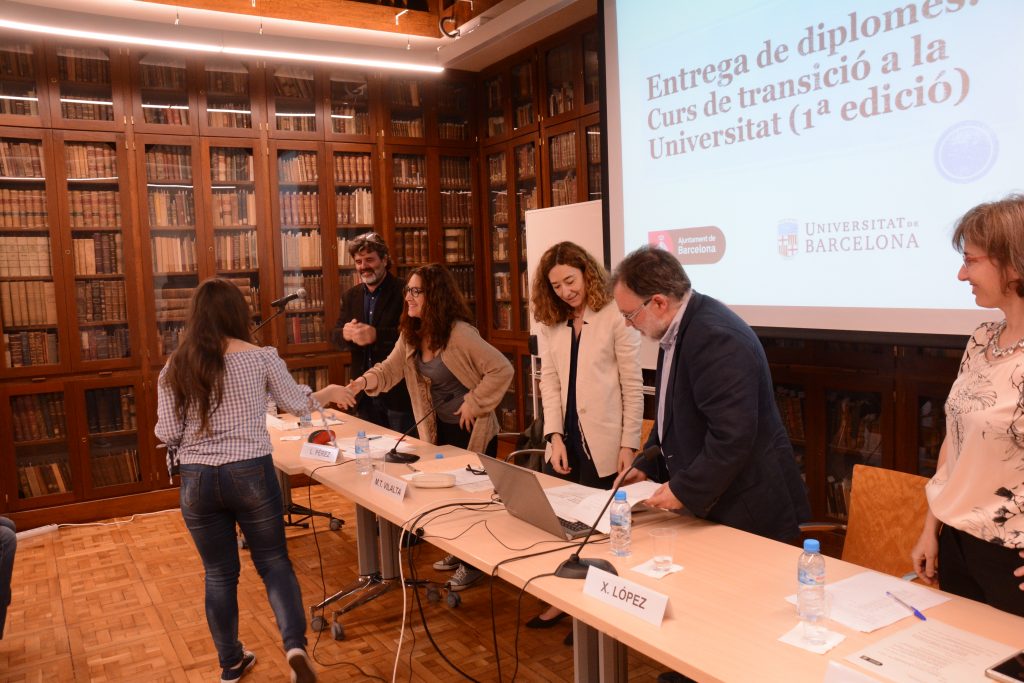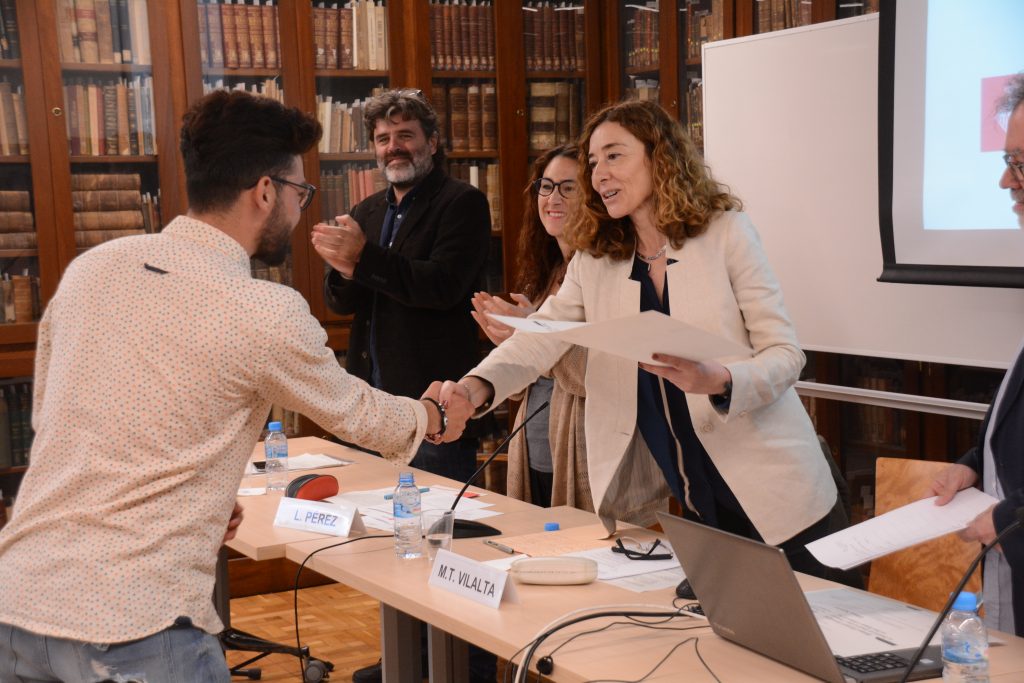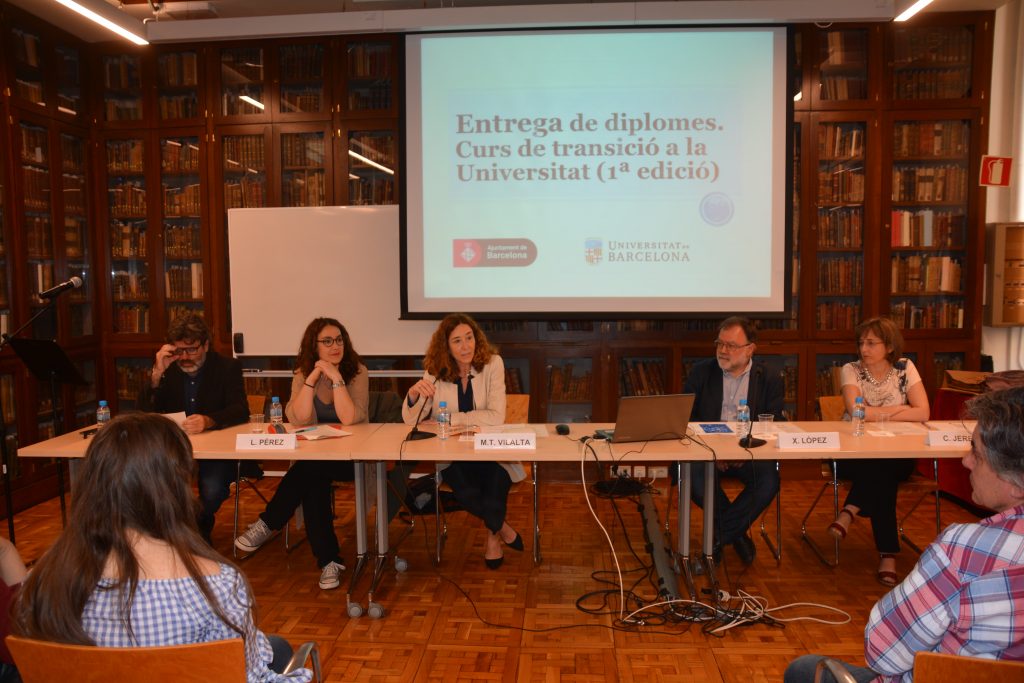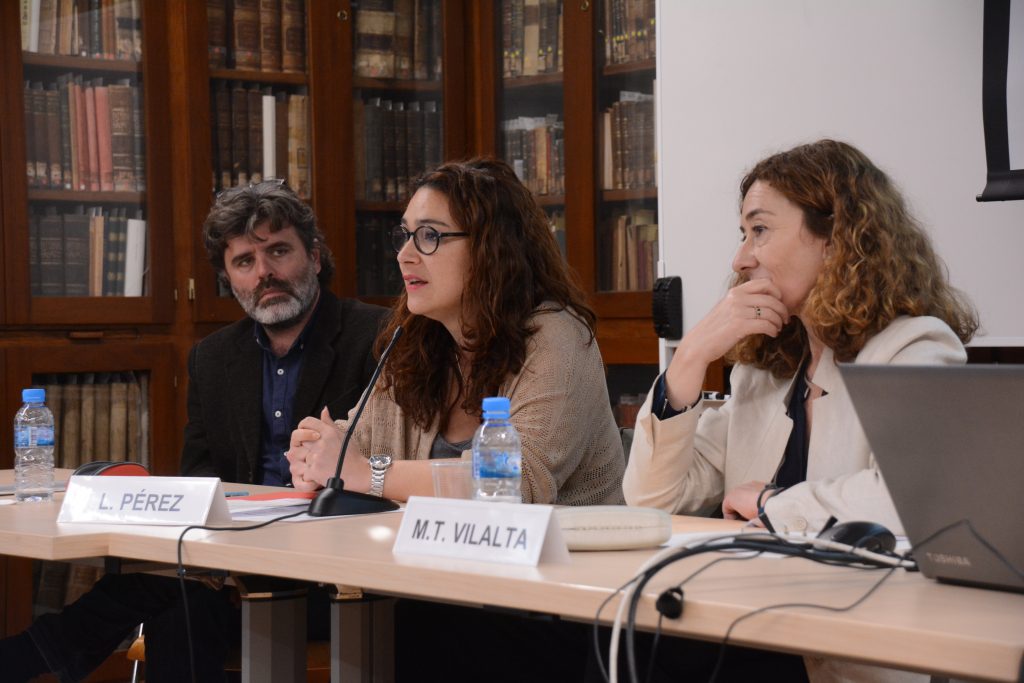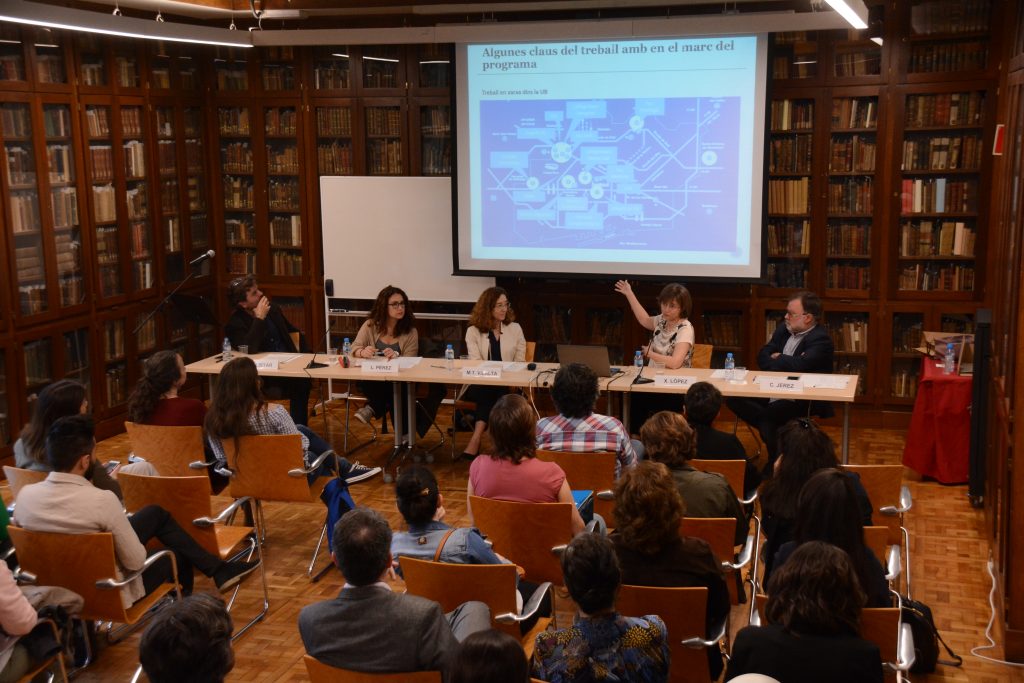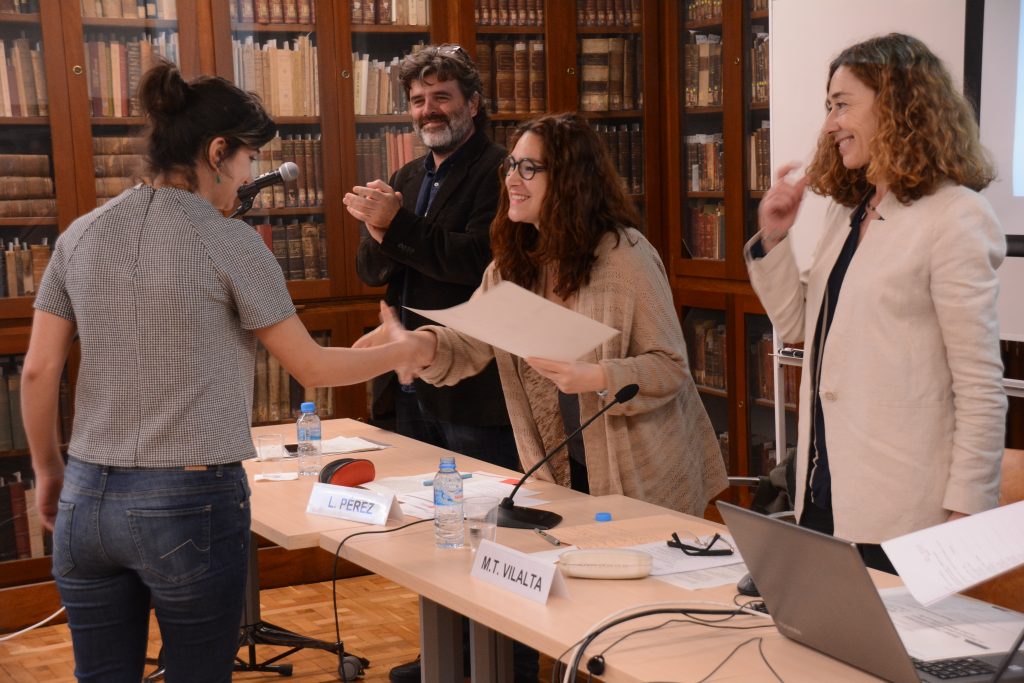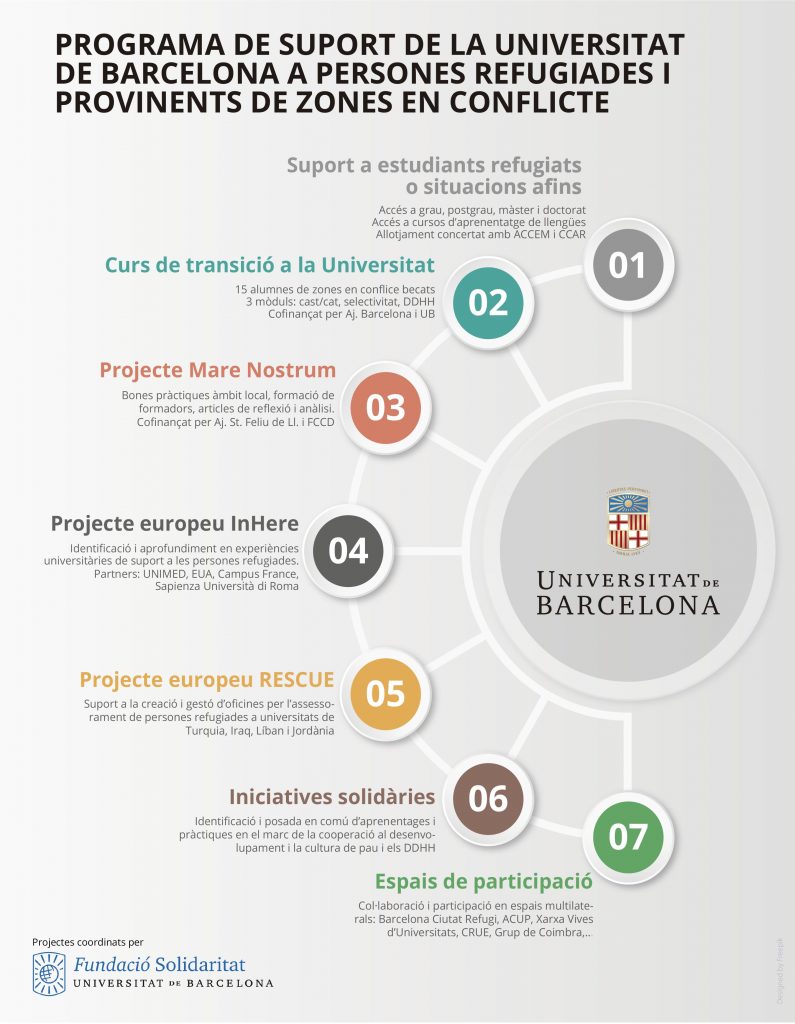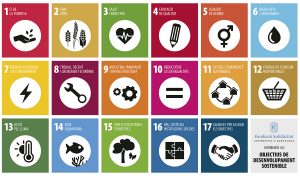The initiative, pioneer in Europe, has the support of the Barcelona City Council, and it is driven within the frame of the University of Barcelona Refugee Support Programme, which has been awarded the Premios Magisterio 2017.
Fourteen students from Syria and Afghanistan received, this Friday, the diploma for the Transition to Bachelor’s Degrees and Training in Human Rights and the Culture of Peace, which they studied during the academic year 2016-2017, within the frame of the University of Barcelona Refugee Support Programme. The ceremony was presided by the vice-rector for Equal Opportunities and Social Action of the UB, Maite Vilalta, together with the councillor of International Relations of the Barcelona City Council, Laura Pérez, and the director of Solidaritat UB Foundation, Xavier López.
Other participants were the director of Global Justice and International Cooperation of the City Council, David Llistar, and the coordinator of the UB Support Program for Refugees and People from Conflict Areas, Cati Jerez.
The course, co-funded by the Barcelona City Council and the University of Barcelona, is a pioneer initiative in Europe, which aims to ease the students’ transition to bachelor, master or professional training degrees, as the only possibility for these people to continue their academic studies. The fourteen students of this first promotion of the course were selected out of queries by humanitarian organizations defending human rights, such as Mitja Lluna Roja or Caritas Syria, which recognized the personal circumstances of these young people.
During her speech, the UB vice-rector Maite Vilalta, said that “the situation of people coming from conflict areas is what interpellates us as people and institution, and which makes us to respond ethically, morally and academically. The UB, as a committed institution to the reality of the world and to society, is giving this response by launching this course and taking its responsibility”. And added: “In this sense, we are glad that the second edition of the course is on during the academic year 2017/2018”.
The councillor of International Relations of the Barcelona City Council, Laura Pérez, noted that “as part of the cooperative actions for global justice in the City Council, interventions in Syria and other conflict countries were a priority over the last three years. In contexts of conflict such as Syria we see there is a generation of youngsters that cannot study and are in risk of entering the armed conflict. Helping leaving the country, continuing the studies, this is a key action to guarantee their opportunities and to contribute to peace. Both editions of this course were a success, and the City Council will provide them with the necessary support for it to continue”.
«Coming here opened the door to new knowledge and support»
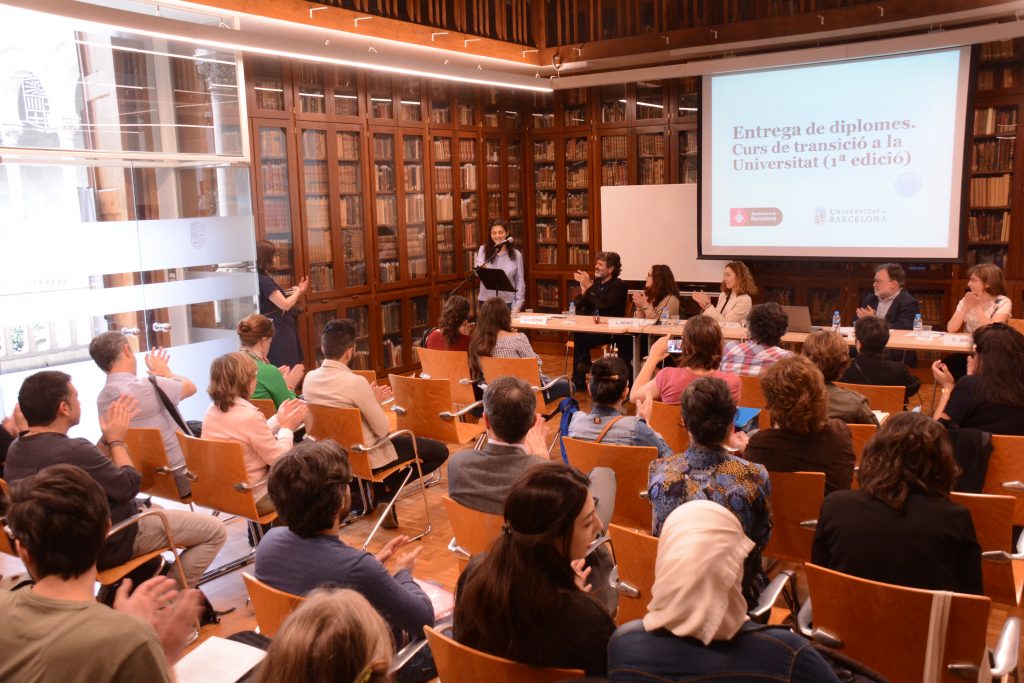
During the ceremony, one of the students, Eliana Sabreen, talked about her experience. The student said she reached her dream of studying Dentistry, in a place without war. Sabreen finished her words on behalf of the fourteen graduates, thanking “the program that gave us the opportunity to leave our country, because we could have not studied there, and came here”. “This –she continued- opened more doors: the door to new knowledge, the door to showing support, the door to understand how big the world is and how important we are. And this lesson showed us it is very important to help humanity”, she concluded.
Currently, the students of the first edition of the course are studying their bachelor and masters’ degrees or professional trainings at the UB, UPC and other educational centres. Fifteen students from Syria, Afghanistan and Pakistan received grants for the second edition of the course, which started this week.
Course functioning
The Course on Transition to Bachelor’s Degrees and Training in Human Rights and the Culture of Peace, organized by the University of Barcelona, through Solidaritat UB Foundation, is a 500-hour training recognized as an extension course. It covers the intensive learning of Catalan and Spanish languages, an approach to University and training on human rights and culture of peace. The grants, aimed at people with a special vulnerability, include accommodation and maintenance, as well as legal assistance, psychological support, social backup and academic counselling, among others.
According to Xavier López, director of Solidaritat UB Foundation, “one thing we get with this course is to personalize a human and social situation, that of searching shelter for those who left the country due conflicts. Having names and surnames for these people, knowing their personal and family experiences, this makes us to empathize with them. (…) If only all people could have a direct relation to these people who leave their home and families. Then it wouldn’t be possible for those governments that didn’t do so, to give shelter to all those people to whom they said they would help”.
UB Support programme for refugees and people from conflict areas
In September 2015, the University launched the UB Support program for refugees and people from conflict areas, aiming to promote the access of this collective to higher education.
According to ACNUR data, only 1 % of young refugee people enter university; while the global percentage is 34 %. UNESCO believes the improvement of access to higher education for the refugees is a key element in the accomplishment of the right to education.
In order to contribute to this improvement, apart from the course of Transition to Bachelor Degrees, the UB Program includes support actions for refugee students through economic aids for the university registration, Catalan and Spanish language courses, mentoring courses, accommodation, legal counselling and psychological assistance.
Within the framework of the Support Programme, the UB is organizing several activities on information, training and awareness on the refugee crisis (such as the Mare Nostrum project, funded by the Catalan Fund for Cooperation and Development) and takes part in European and International projects such as inHERE (Higher Education Supporting Refugees in Europe) and RESCUEinternal work network with fifteen groups, departments and areas in the UB; an interuniversity collaboration network, and an external network, which includes collaboration agreements with public administrations, education centers and entities that work with refugees and asylum seekers.
The UB program has been awarded the Premios Magisterio – Protagonistas de la Educación 2017 and has been included in the inHERE Good Practise Catalogue. It has been presented as good practice as well in the 15th International Conference and 25th University and Inclusive Education Days (University of Granada, March 2018) and in the inHERE training week (La Sapienza University of Rome, April 2018).
This news is related to the following SDG of 2030 Agenda:





